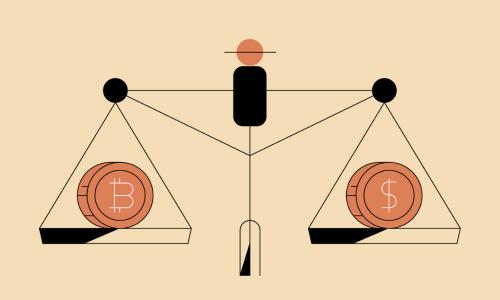Cryptocurrency vs. digital currency

The world is transforming from traditional to digital wallets. A digital wallet houses digital currency and a cryptocurrency using advanced blockchain technology. Yes, digital currency and cryptocurrency can be confusing for newcomers.
These two currencies differ significantly in the digital wallet. Digital currency is the electronic model of currency notes and coins saved in a digital wallet. Digital currency can be converted to cash at any ATM or bank. It's intangible cash with open-source contactless transactions.
Cryptocurrency is a highly volatile form of digital currency. Bitcoin, Ethereum, Dogecoin, and others launched cryptocurrencies on the market. It uses blockchain technology to ensure smooth transactions.
Digital Currency
Wikipedia says that "digital currency," also called "digital money," "electronic money," or "electronic currency," is a balance or record that is kept in a distributed database on the Internet, in an electronic computer database, in digital files, or on a stored-value card. E-Cash, cryptocurrencies, virtual currencies, and central bank digital currencies are digital currencies.
Digital currencies have characteristics similar to other currencies but no physical presence. Without a tangible reality, cryptocurrencies allow for immediate transactions. Virtual currencies, which are not created by governments, are not legal tender and allow for cross-border ownership transfers.
A virtual currency is a digital representation of value that is not issued by a central bank, credit institution, or e-money institution, according to the European Central Bank's 2015 study, "Virtual currency schemes - a further analysis." In some cases, it might be used in place of money. Online purchases of goods and services are made using digital currencies.
Digital money is digital and has no real-world equivalent. It acts like regular fiat money. You can receive, transfer, and swap digital currency for another currency. It has no geographical or political borders and can be used to pay for products and services online.
As we march toward a cashless future, some say actual money used online for banking and shopping should be considered digital currency.
Define Cryptocurrencies
Cryptocurrencies are digital assets designed to be exchanged. Computerized ledgers record who owns each coin. Strong cryptography protects transaction records, controls coin generation, and verifies ownership changes.
It's usually digital and not issued by a central authority. Cryptocurrencies are decentralized, unlike digital currency and major banking institutions. When a cryptocurrency is produced or created before issuance, it's considered centralized. Each cryptocurrency works using distributed ledger technology, often a blockchain, as a public financial transaction database when decentralized.
Bitcoin, published in 2009 as open-source software, is the first decentralized cryptocurrency. After Bitcoin, several cryptocurrencies were launched.
Cryptocurrencies are digital currencies that are backed by certain technologies, assets, or projects. They are used as tokens in certain online communities. They're generally used for peer-to-peer payments but also for real-world goods and services.
Cryptocurrency is trusted because it uses cryptography. Cryptography is a blend of sciences with arithmetic as its base.
Blockchain technology and a decentralized ledger are used by cryptocurrencies, which means no one person or regulatory body has authority over the network. Incredible decentralization!
Cryptocurrency vs. digital currency
Cryptocurrency is defined in two ways, like digital currency.
The most common way to explain cryptocurrency is that it is a digital currency that is stored on a blockchain and has no official physical asset. Bitcoin fits.
Cryptocurrency is a virtual currency with no cryptographically-secured tangible assets. It is not widely used.
Second, any digital security can be used to build a cryptocurrency. Many reasons prevent individuals from using the term this way.
Almost any currency can be a cryptocurrency, using this definition. But just because your bank uses cryptography to secure your money doesn't make it a cryptocurrency.
Digital currencies vs. cryptocurrencies – The Differences
Encryption This is the main distinction between digital currency and digital wallet cryptocurrency. Digital currency isn't encrypted, but cryptocurrency is. In digital currency, you must open an account without security. Your bank account can be hacked at anytime, and you could lose all your money. To protect Bitcoins and Dogecoins from cyberattacks, you must sign up for an account on a forum with a security system.
Current Rate
Digital currency is current and easy to deal with on the worldwide market. No transaction requires substantial study. The cryptocurrency markets are turbulent. It's a risky investment or heavy business transaction without extensive research. During a transaction, the cryptocurrency rate may change suddenly.
Transparency
There's some transparency in digital currency information. The recipient or sender of digital currency only gets the amount, bank, time, and date. But cryptocurrency transparency is critical. Blockchain technology shows both parties' previous and current transactions. No one else can hear the dealers' private chats.
Authority
The Reserve Bank controls the digital currency's whole banking system. Banks can monitor the transaction flow of digital and physical wallets. In cryptocurrency, there is no third party with authority over investors.
Fees
Digital wallet payments incur high transaction fees with digital currency. Cryptocurrencies don't have transaction fees. Blockchain technology reduces costs and eliminates third-party fees. Cryptocurrency helps investors handle massive asset trades.
"Digital currency" and "cryptocurrency" are different. Online currency is a digital currency.
Cryptocurrency refers to currency kept as a record on a blockchain database. This distinction has tax consequences.
The IRS taxes digital currency as money and income. The IRS taxes cryptocurrency and other digital assets as property.
Post Your Ad Here
Comments